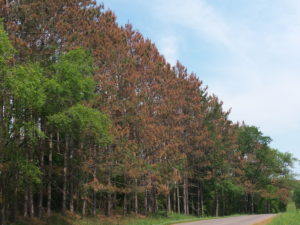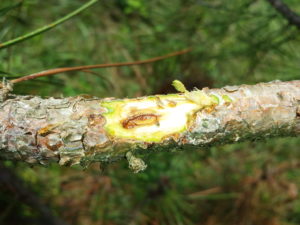
Hail-induced Diplodia shoot blight. (Photo by Paul Cigan)
Red pine stands in a localized area of southwestern Polk and northwestern St. Croix counties are displaying heavy crown browning, shoot blight, and tree mortality following a June hail storm that left many red pine injured in local plantations. In many stands, the entire crown on most overstory trees has turned brown, leaving behind a stark illustration of just how damaging the fungal pathogen, Diplodia pinea, can be to red pine following hail storms. Bark-breaking hail wounds on red pine of all ages serve as entry points for wind- and rain-dispersed spores of the disease. Wet and warm spring and summer weather, similar to conditions observed this year, can promote spore production and intensify infections. Cankers soon develop at infected wound sites, enlarge, and may cause death of branches and terminal shoots within weeks. Landowners affected by hail and Diplodia damage should contact their local DNR forester to evaluate the extent and severity of damage, discuss management options, and identify contacts in wood-utilizing industries to coordinate salvage operations on smaller acreages.

Bleeding Diplodia canker
Generally, salvage and pre-salvage harvest efforts should prioritize the removal of pine with greater than 50% crown browning and those with at least 3 feet of terminal leader dieback. Trees with less damage should be monitored for bark beetle attack for two years after thinning and be promptly removed if crowns begin browning due to bark beetle attack. To reduce bark beetle attack during harvesting March through August, remove all material greater than 2 inches in diameter within three weeks of harvest.
Written by Paul Cigan, forest health specialist, Hayward (Paul.Cigan@Wisconsin.gov), 715-416-4920.
